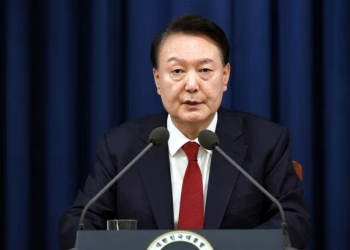Nobel laureate Muhammad Yunus, a long-time adversary of Bangladesh’s ousted Prime Minister Sheikh Hasina, has been appointed as the country’s interim leader. The 84-year-old Yunus was named to the position a day after Hasina fled the country amidst weeks of violent protests that led to her resignation.
Prof. Yunus, renowned for his pioneering work in microloans, was seen by Hasina as a public enemy and is currently on bail while appealing a six-month prison sentence in what he claims is a politically motivated case.
The student-led protests that resulted in Hasina’s removal rejected a military-led government and advocated for Yunus to lead the interim administration. This decision followed discussions between President Mohammed Shahabuddin, military leaders, and student representatives.
Prof. Yunus, who is returning to Dhaka from Paris where he was undergoing a minor medical procedure, expressed his commitment to stepping in during this critical period, stating, “When the students who sacrificed so much are requesting me to step in at this difficult juncture, how can I refuse?”
The protests, which began in early July with university students demanding an end to civil service job quotas, escalated into a broad anti-government movement. Over 400 people have died in clashes between government forces and protesters, with more than 100 fatalities reported on a single day recently. The violence has also seen hundreds of police stations set on fire.
Hours before protesters stormed and looted her official residence in Dhaka, Hasina resigned and fled to India, ending her nearly 15-year rule. Despite economic growth during her tenure, Hasina faced increasing criticism for suppressing dissent and imprisoning political opponents.
Former Prime Minister Khaleda Zia and activist Ahmad Bin Quasem, among others, were released following Hasina’s exit. Zia, who chairs the Bangladesh Nationalist Party and had boycotted elections in 2014 and 2024, was imprisoned in 2018 on corruption charges she claims were politically motivated. Rights groups have also highlighted Quasem’s detention in 2016 as part of a broader pattern of forced disappearances during Hasina’s administration.















